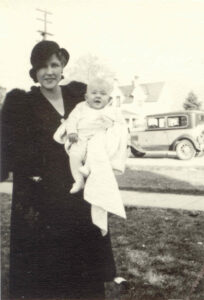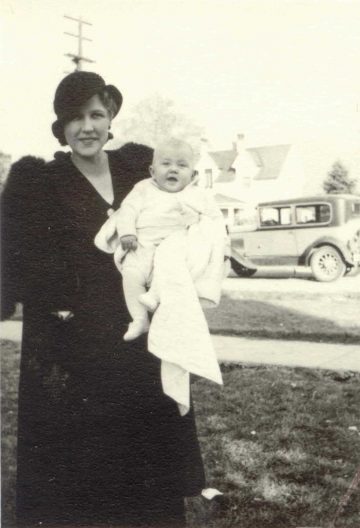
When I was a teenager, I didn’t like to be around my grandma.
I had not grown up in Utah. My 1960’s childhood in the Bay Area of California, and 1970’s teen years in a small college town in Minnesota had not shaped me to fit in to her image of a proper young woman. I felt she was always comparing my appearance to that of my Utah-raised cousins. She would tell me how my hair should be styled, my clothes were immodest, I needed more restrictive underwear, I should control my acne, I shouldn’t sit on the grass, I was listening to the wrong music, I needed to plan on a practical degree in Home Economics, I shouldn’t be such a tomboy, and on and on.
I was especially surprised when she saw me doing some freehand embroidery (something that I thought she would approve since it was considered more feminine at the time), but I was doing it on Sunday, and she told me any sewing I did on a Sunday I would need to undo in the next life. And that I would have to undo it with my nose. It was hard not to ridicule her for that.
I was not someone who could be easily swayed by a differing opinion, or even by criticism. But this was my grandma. Family. And I wanted to like to spend time with her. But it was painful, and getting more difficult.
Finally, after a visit where I pushed back on some of the things she told me to do differently, and she did not respond kindly, I went to my dad and told him I just didn’t want to be around her anymore.
He didn’t minimize or dismiss my hurt. He didn’t excuse her. He didn’t insist I put up with it.
He listened.
Then he went to talk with his mother. From what I heard about the conversation, he did not condemn her, or accuse her of not caring. He acknowledged that he knew she loved her grandkids, and that she felt strongly about showing her love by telling us to do things she felt would help us have a better life. Things that she was sure would help us be happier, because this is what made her happy.
And he told her that if she kept doing it, she was going to lose her grandkids. It saddened him to think that his kids were going to miss out on getting to know their grandma for the amazing, intelligent, strong woman he knew her to be, just because she could not just enjoy getting to know us for who we are, and trust us to navigate through this complex journey of growing up. He told her that he thought we would learn more from her if she would just share her life with us, her struggles and what she had learned, than if she kept telling us what we were doing wrong or what we needed to change.
He told her he would like us to see that her love for us was stronger than anything else.
She listened.
She took my older sister and me to lunch, and just asked us about our lives. She began to share her life with us, her thoughts that had nothing to do with our appearance or behavior. I began to see her sense of humor.
It was the beginning of me learning of how she was bullied as a child, how she struggled to present herself well, even though she was poor. Of how she wanted to protect her granddaughters from inequities of a system that favored men. And how she did not readily submit to a man’s differing opinion. I especially liked the account of how she stood up to Bruce R. McConkie when he was visiting the mission home in Minnesota, where she and Grandpa were serving as mission presidents.
It was the beginning of me discovering I had a grandma who was strong, feisty, smart, and who guided some of my early feminism (even though she would have called it good common sense).
It was the beginning of me knowing she loved me.
I am so grateful my dad listened to me, and she listened to him.
I got to have 20 more years to get to know her and love her.
When I spoke at her funeral, I did not have to pretend affection, or make up something nice to say. I truly mourned the loss of her, and I was able to acknowledge the bumpy road that led to learning to love her.
I especially loved the final message she gave to me. In her instructions for her funeral, in the mid 1990’s, when this was not done, she requested that her granddaughters be her pallbearers. Not honorary pallbearers, but her actual pallbearers.
She set aside tradition, and asked us to be the ones who lovingly carried her on her last mortal journey.
I wonder about learning to listen.
I wonder what my grandma and my dad would think about what is happening now. About social media becoming a place where people avoid listening. About how corporations have entire law firms that not only protect, but prevent them from listening. How families become a narrow definition, or legal battleground, or shameful dogma, rather than a relational group where we can practice and learn mercy, repentance and grace.
This physical isolation is causing us to create a new way of functioning in the world, and new way of connecting and of being related.
I lead trainings for suicide prevention online now. I try to convey, through the screen, the importance of listening, the importance of letting go of the need to fix someone, the importance of letting go of “should”-ing on people. There are few things more effective in suicide prevention than just sitting with, listening deeply, and letting go of trying to change someone. Few things are more effective than these in conveying love. (If you, or someone you know is experiencing thoughts of suicide, please call the Suicide Prevention Hotline – 800-273-8255.)
I do not want the world to go back to the way it was before the pandemic.
I want us to see this as a call to listen. Listen, even when it confronts us, challenges us to look at how we have done things up to now. Listen for how we are not being who we say we want to be.
I want families, churches, schools, businesses, political groups, advocates, activists, people in any leadership position…all of us.
I want us to listen to each other, and learn to be connected so deeply that we will dismantle the barriers that have kept us from experiencing love and mercy.
During the last 20 years of my grandma’s life, I don’t recall any need to agree with her, or conform to her ideas. I remember hearing so many fascinating stories about her life, and I remember her listening to me share mine. I felt important, and valued around her. Her influence helped me learn to handle my own finances, and to develop my independent voice. And I think she would smile to know I have become very grateful for Spanx underwear.
I hope this time of pandemic has taught us what it is like to feel alone, and non-essential. I hope we remember how hard it is to not be able to go where you want to belong, or to not feel safe in your community.
I hope, when we can physically gather again, we will welcome all who want to gather. I hope we will want to get to know each other for who we are, and not impose our “should” on each other. I hope we will appreciate the difference each unique life can make in the world, and resist trying to require agreement or conformity for its own sake. I hope we will recognize that we are all the least of these. We are all at risk of feeling rejected. We are all at risk of illness or death. We all want to know we are loved.
We all want loving hands to help carry us on our journey.
I hope we learn a love that is stronger than death.




13 Responses
“Attention is the beginning of devotion.”
Mary Oliver
Thank you so much for this post. Beautifully expressed and something I needed today.
Beautifully written and poignant, Jody. Your dad was a an incredible listener (he was the BYU professor who inspired me to think critically and want to go to graduate school) and his legacy lives on in you. I’m moved by your grandmother’s ability to transform her relationship with her grandchildren because she listened to her son, and then to her grandchildren. Your family’s story demonstrates how generational trauma could be undone simply through listening and working to transform our relationships based on the feedback we get from those we love. One conversation at a time. Thank you for sharing, friend.
I got misty-eyed reading this, Jodie. Love you and love your family–
Karen
I loved this Jody! Every word. But I had to laugh because my grandma Henderson gave me the same warning about sewing on Sunday.
Once again, you hit it out of the park. Thank you for the reminder that we all want to be seen, heard, and loved.
Fond memories of my strait-laced grandma flooded through me as I read your piece. Older generational attitudes and ideas were difficult to shake. I remember sitting in my grandma’s rocker listening to her and my uncle furiously debating whether there was even such a thing as homosexuality. ‘Not possible, insisted my beloved grandmother. Shame on you, don’t even talk of such behavior’. Oh my!
My grandma used to say the exact same thing about sewing on Sunday– that you’d have to take the stitches out with your nose in the next life! In her case I seem to remember that it was said with a laugh (and she was still known to embroider on the Sabbath at times). I had never heard that from anybody but her, and I thought it might have been something she made up herself. Guess not though, as, it sounds like quite a few grandmas said the same thing.
thank you so much for this.. it really helped me xxxx
The listening is really key. Thank you for this timely reminder…especially this part: “I want us to listen to each other, and learn to be connected so deeply that we will dismantle the barriers that have kept us from experiencing love and mercy.”
How wonderful! Listening, especially when the feedback is unpleasant, is so hard. It sound like you had wonderful examples.
What a beautiful post, Jody! I love that your dad was so wise in how he approached your grandma. And how your grandma was so wise in listening to good advice and changing directions. These are terrific models.
This was really beautiful Jody. Thank you.
beautiful! i wish I had known my grandmothers <3 great reminder for healing relationships